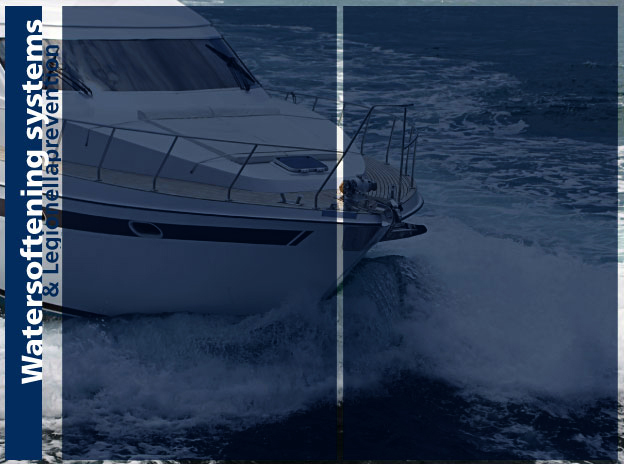 |
||||||||||
 |
||||||||||
 |
||||||||||
 |
 |
 |
||||||||

Hard water
Definition of hard water:
Most of our water include minerals like calcium and magnesium. These two contaminants produce what is commonly referred to "hardness" in water.
Consequences of hard water: Exterior
If the yacht is cleaned with hard water, a calcium film, stains and spots will be left behind. This is showed most clearly at dark exteriors. The same calcium film, stains and spots will be left behind on the windows causing poor visibility.
Loss of shine
Under the influence of UV-signs and wind, hard water has damaging effects on the paint and gelcoats. The yacht must be polished and cleaned more often. During every cleaning part of the topmaterial will me removed and this will result in earlier spraying of the yacht.
Consequences hard water: Interior
If hard water is heated over 60 degrees Celcius, the calcium will cause the following effects: - Calcium film on all sanitary equipment, taps, showers, tiles etc.
Definition of hard water:
Most of our water include minerals like calcium and magnesium. These two contaminants produce what is commonly referred to "hardness" in water.
Consequences of hard water: Exterior
If the yacht is cleaned with hard water, a calcium film, stains and spots will be left behind. This is showed most clearly at dark exteriors. The same calcium film, stains and spots will be left behind on the windows causing poor visibility.
Loss of shine
Under the influence of UV-signs and wind, hard water has damaging effects on the paint and gelcoats. The yacht must be polished and cleaned more often. During every cleaning part of the topmaterial will me removed and this will result in earlier spraying of the yacht.
Consequences hard water: Interior
If hard water is heated over 60 degrees Celcius, the calcium will cause the following effects: - Calcium film on all sanitary equipment, taps, showers, tiles etc.
- Calcium film on the dishwasher, washing machine, coffee maker etc. When these calcium deposits start building up, water outlets can slow down or become clogged.
Watersoftening system
With the installation of a B Y S watersoftening- system on the yacht, there will be continuously soft water. Both exterior and interior of the yacht will benefit from this system. The paint and gelcoats will be protected and there is no need for extra cleaning.
Installation and usage
With the installation of a B Y S watersoftening- system by our expertised employees there will not be any calcium building up on the yacht. Old calcium film disappears when you start to clear the tapwater from calcium and magnesium.
The B Y S watersoftening system is recommended by suppliers of paint and gelcoats.
Onboard water safety with B Y S legionellaprevention.
Watersoftening systems